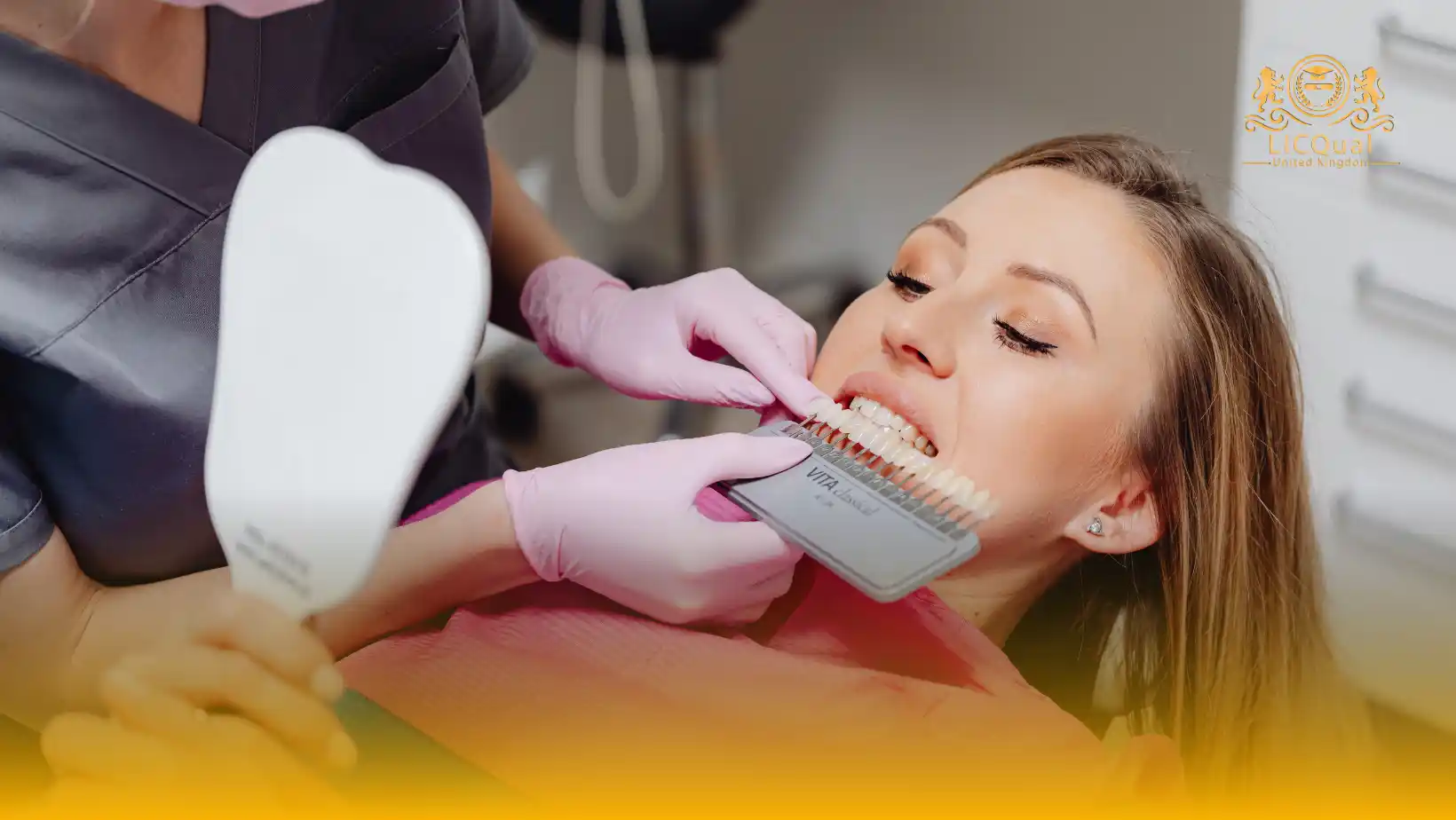The LICQual Level 3 Diploma in Prosthodontics is a specialised qualification designed for dental professionals seeking to advance their expertise in prosthodontic care. This programme is not intended for fresh entrants but is tailored for experienced practitioners who wish to enhance their career prospects, broaden their professional knowledge, and fulfil their Continuing Professional Development (CPD) requirements.
Learners undertaking this diploma will gain comprehensive insights into advanced prosthodontic techniques, including the assessment, planning, and restoration of complex dental cases. The curriculum combines theoretical understanding with practical application, ensuring learners develop the skills required to deliver high-quality patient care confidently and safely.
Centres delivering the LICQual Level 3 Diploma in Prosthodontics must maintain the highest standards of teaching. This includes having competent and qualified staff, access to up-to-date prosthodontic materials and resources, and facilities that support effective learning and skills development. By providing a structured and supportive learning environment, centres help learners achieve their full potential and succeed in this advanced field of dentistry.
Completing this diploma empowers learners to demonstrate professional excellence, expand their clinical capabilities, and position themselves competitively within the dental industry. It is ideal for dentists, dental technicians, and allied dental professionals who are committed to advancing their expertise and delivering exceptional prosthodontic care.
Course Overview
Qualification Title
LICQual Level 3 Diploma in Prosthodontics
Total Units
6
Total Credits
60
GLH
240
Qualification #
LICQ2200655
Qualification Specification
To enroll in the LICQual Level 3 Diploma in Prosthodontics, applicants must meet the following criteria:
|
Qualification# |
Unit Title |
Credits |
GLH |
|---|---|---|---|
|
LICQ2200655-1 |
Principles of Prosthodontics |
10 |
40 |
|
LICQ2200655-2 |
Removable Prosthodontics |
10 |
40 |
|
LICQ2200655-3 |
Fixed Prosthodontics |
10 |
40 |
|
LICQ2200655-4 |
Implant-Supported Prosthodontics |
10 |
40 |
|
LICQ2200655-5 |
Occlusion and Functional Assessment |
10 |
40 |
|
LICQ2200655-6 |
Clinical Case Management and Treatment Planning |
10 |
40 |
By the end of this course, learners will be able to:
Unit 1: Principles of Prosthodontics
By the end of this unit, learners will be able to:
- Explain the fundamental concepts and principles of prosthodontics.
- Assess patients’ oral health and identify prosthodontic needs.
- Understand different types of prosthetic appliances and their applications.
- Apply knowledge of prosthodontic terminology in clinical contexts.
Unit 2: Removable Prosthodontics
By the end of this unit, learners will be able to:
- Design and fabricate removable dental prostheses.
- Evaluate patient suitability for dentures and other removable appliances.
- Perform fitting, adjustment, and maintenance of removable prosthetics.
- Address common complications associated with removable appliances.
Unit 3: Fixed Prosthodontics
By the end of this unit, learners will be able to:
- Plan and prepare teeth for fixed restorations such as crowns and bridges.
- Select appropriate materials for fixed prosthetic applications.
- Demonstrate clinical procedures for the placement of fixed restorations.
- Identify and manage potential complications in fixed prosthodontic treatments.
Unit 4: Implant-Supported Prosthodontics
By the end of this unit, learners will be able to:
- Understand the principles and procedures of implant-supported prostheses.
- Evaluate patients for suitability for dental implants.
- Plan and restore implant-supported prosthetic treatments.
- Demonstrate knowledge of surgical considerations and post-operative care.
Unit 5: Occlusion and Functional Assessment
By the end of this unit, learners will be able to:
- Analyse occlusion and jaw function in prosthodontic patients.
- Apply bite analysis techniques to support treatment planning.
- Identify and correct occlusal issues in prosthetic cases.
- Understand the relationship between occlusion, function, and patient comfort.
Unit 6: Clinical Case Management and Treatment Planning
By the end of this unit, learners will be able to:
- Assess complex prosthodontic cases and develop comprehensive treatment plans.
- Apply clinical decision-making skills in patient management.
- Integrate knowledge of removable, fixed, and implant prosthodontics in case planning.
- Evaluate treatment outcomes and propose improvements for future cases.
The LICQual Level 3 Diploma in Prosthodontics is designed for dental professionals who want to advance their expertise in restorative dentistry, improve patient outcomes, and gain internationally recognized certification. This course is ideal for dentists, prosthodontists, and allied dental professionals aiming to specialize in dental restoration, prosthetic design, and oral rehabilitation.
1. General Dentists and Practitioners
- Dentists aiming to expand their restorative dentistry skills.
- Professionals seeking advanced training in crowns, bridges, and dentures.
- Clinicians looking for internationally recognized certification in prosthodontics.
- Dentists wanting to improve patient satisfaction with functional restorations.
- Practitioners interested in mastering evidence-based prosthodontic techniques.
2. Prosthodontists and Specialists
- Specialists enhancing skills in fixed and removable prosthetics.
- Professionals managing complex restorative cases.
- Experts learning implant-supported prosthetics and occlusal management.
- Clinicians focused on aesthetic and functional outcomes for patients.
- Specialists staying updated with modern prosthodontic practices.
3. Dental Hygienists and Assistants
- Hygienists learning to support prosthodontic procedures efficiently.
- Assistants gaining skills in patient preparation and post-procedure care.
- Professionals improving workflow in restorative dental practice.
- Team members ensuring patient comfort and procedural safety.
- Staff aiming to gain certification and enhance career opportunities.
4. Dental Students and Graduates
- Recent graduates preparing for specialized careers in prosthodontics.
- Students seeking hands-on clinical experience in dental restorations.
- Learners aiming for internationally recognized credentials.
- Individuals building foundational skills in prosthetic design and oral rehabilitation.
- Aspiring dental professionals focused on comprehensive patient care.
5. Academic and Research Professionals
- Educators incorporating prosthodontics into dental curricula.
- Researchers studying restorative techniques and patient outcomes.
- Academics developing evidence-based protocols for prosthodontic care.
- Professionals conducting clinical studies on restorative dental procedures.
- Instructors providing hands-on training for students in prosthodontics.
6. Multidisciplinary Dental Teams
- Medical and dental staff collaborating on patient oral rehabilitation.
- Professionals integrating restorative care into overall treatment plans.
- Staff ensuring safe, effective, and coordinated patient care.
- Team members focusing on patient outcomes and workflow efficiency.
- Practitioners optimizing communication and collaboration in prosthodontics.
7. Career-Focused Dental Professionals
- Individuals seeking to enhance clinical and restorative skills.
- Professionals aiming for globally recognized prosthodontics certification.
- Dentists expanding practice offerings with advanced restorative procedures.
- Learners improving professional credibility and reputation.
- Dental professionals committed to excellence in patient care and prosthodontic outcomes.
This course equips a broad range of dental professionals with advanced expertise in prosthodontics, enabling them to deliver high-quality restorative care while advancing their careers.
To deliver the LICQual Level 3 Certificate in Prosthodontics effectively, training centres must meet the following requirements to ensure high-quality learning and learner success:
- Qualified and Competent Staff: Centres must have experienced dental educators and clinicians who hold recognised qualifications in prosthodontics or related dental fields. Staff should be skilled in both theoretical instruction and practical training.
- Adequate Facilities: Centres must provide suitable clinical environments, including treatment rooms, laboratories, and demonstration areas that meet health and safety standards.
- Access to Prosthodontic Materials: Centres should supply learners with all necessary materials, tools, and equipment for practical training, including removable and fixed prosthetic components, dental implants, and impression materials.
- Learning Resources: Centres must provide up-to-date learning materials, textbooks, and digital resources to support both theoretical and practical components of the course.
- Health and Safety Compliance: Centres must comply with all relevant dental health and safety regulations, infection control standards, and professional guidelines.
- Assessment and Support: Centres should have systems in place for continuous learner assessment, feedback, and guidance to ensure successful course completion.
- Commitment to Quality: Centres must maintain high standards of teaching, monitoring, and quality assurance to provide an effective and professional learning experience.
Meeting these centre requirements ensures learners receive comprehensive, safe, and practical training, equipping them with the skills and confidence to excel in prosthodontics.
Assessment and Verification
All units within this qualification are subject to internal assessment by the approved centre and external verification by LICQual. The qualification follows a criterion-referenced assessment approach, ensuring that learners meet all specified learning outcomes.
To achieve a ‘Pass’ in any unit, learners must provide valid, sufficient, and authentic evidence demonstrating their attainment of all learning outcomes and compliance with the prescribed assessment criteria. The Assessor is responsible for evaluating the evidence and determining whether the learner has successfully met the required standards.
Assessors must maintain a clear and comprehensive audit trail, documenting the basis for their assessment decisions to ensure transparency, consistency, and compliance with quality assurance requirements.







